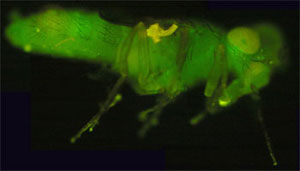November 8, 2004
Fly Clones Generate Media Buzz
How a Dalhousie story became a hit with media
by Charles Crosby
 | ||
| For media coverage of this story, see DALHOUSIE IN THE NEWS | ||
"You did what?"
"Cloned a fruit fly."
"Why?"
"Not sure. Cause we can, I guess. Maybe you want to talk to the researcher who did it."
"Absolutely. This is news."
That's a fair, if abbreviated, account of a conversation I had with reporters, news and assignment editors over and over this week. If you read a paper, listened to radio or tuned in TV news, chances are you saw something about the exciting research of Dalhousie Biology Professor Vett Lloyd.
Dr. Lloyd's team is the first to successfully clone insects. The breakthrough research, using fruit flies, was featured in the British on-line publication Nature.com. Since then, it's become big news on both sides of the Atlantic.
Dr. Lloyd is surprised by the attention. "I never knew so many people cared about fruit flies - cloned or otherwise," she said after the latest round of interviews. Truth is, they don't. So what makes this news?
It's a breakthrough. People are always interested in "firsts". Whether it's a new discovery or a new approach to an old challenge, be first and you will draw attention. Remember Neil Armstrong? Name the second guy to walk on the moon?
A relevant or timely subject matter, in this case cloning, creates the perfect context for news. It doesn't hurt one bit that the subject is tinged, often steeped, in controversy. Cloning pushes the bounds of human knowledge. For many, it raises serious doubts. News and news.
A new angle on a recurring theme is very often newsworthy. The angle here is unexpected, perhaps even quirky. One editor called it Frankenfly. The subject matter raises a compelling question - in this case: 'why would anyone want more fruit flies in the world?' - people are compelled to try to answer it. (Case in point: most stories opened with a lead along the lines of: "do we really need more fruit flies?")
Any one of these factors - a breakthrough; relevance; a new angle; something unexpected - can, in and of itself, be "newsworthy." Dr. Lloyd's cloned fruit fly covered all the bases. It couldn't miss.
The fact is, there is fascinating work taking place every day at Dalhousie, that may not seem like "news" to those who are doing it. Some of that work is news. Some of it may not be today, but it will be tomorrow. Some will never be.
But when it is news, we ought to tell it. Because when Dalhousie is in the news for any of the great work done here we are adding to public understanding of what goes on at universities. We are raising the profile and enhancing the reputation of our university. That's important at a time when universities are competing for public funding, for philanthropic dollars and for students.
A final word about Dr. Lloyd. Every story needs a narrator, and the best news storytellers are the people closest to the news. In this case, that was Dr. Vett Lloyd. She did not seek, nor relish the media spotlight. But she stood in it, and did another great job for Dalhousie.
In every regional newspaper, television and radio station, Dr. Lloyd and her fruit flies made news. The story spread further to media outlets in the UK, Belgium and South Africa. And now that the election is decided, US publications are starting to run their stories on Dalhousie University, Dr. Lloyd and her flies.
